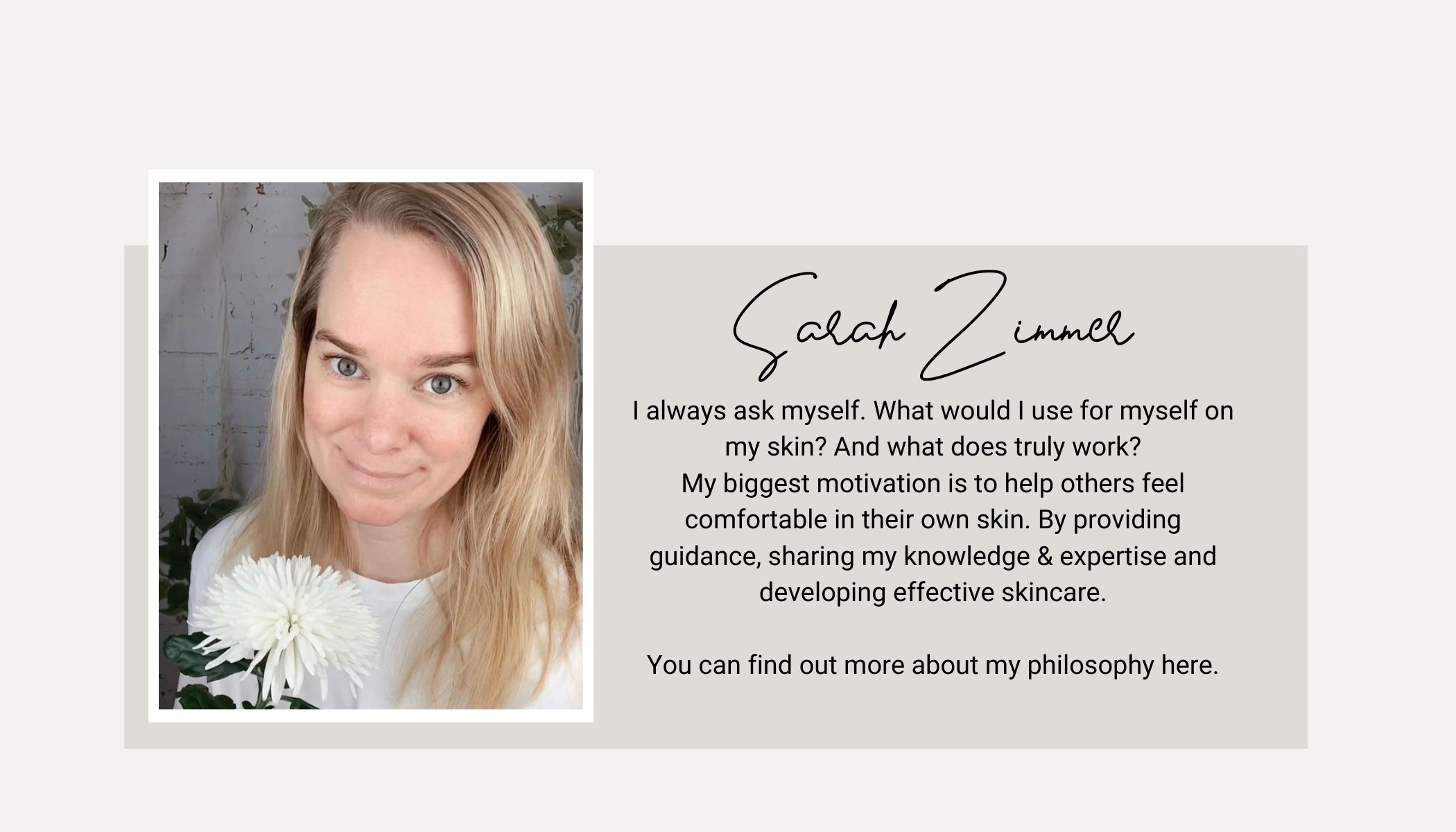Stress und Hautpflege: Wie du gestresste Haut beruhigen kannst

Hautpflege geht über Produkte hinaus
Die Gesundheit unserer Haut hängt von mehr ab als nur von den Hautpflegeprodukten, die wir verwenden. Tatsächlich wird etwa 70 % der Hautbeschaffenheit von unserer Ernährung und unseren Lebensgewohnheiten beeinflusst, während nur 30 % durch die topischen Behandlungen, die wir anwenden, betroffen sind. In unserem stetig wachsenden Verständnis darüber, wie Stress unser allgemeines Wohlbefinden beeinflusst, ist es keine Überraschung, dass er auch unsere Haut beeinträchtigen kann.
Als Teil meines ganzheitlichen, langfristigen Ansatzes zur Hautpflege habe ich die komplexe Verbindung zwischen Stress und Hautgesundheit untersucht. Hier betrachten wir diese Beziehung genauer und geben einige wertvolle Tipps, wie du eine strahlende und jugendliche Haut bewahren kannst.
Die Wissenschaft hinter Stress und deiner Haut
Erhöhte Cortisolspiegel, ein Hormon, das als Reaktion auf Stress von den Nebennieren produziert wird, können tiefgreifende Auswirkungen auf die Haut haben. Chronischer Stress, gekennzeichnet durch ständig hohe Cortisolwerte, löst eine Reihe von Ereignissen im Körper aus. Eine der bedeutendsten Folgen ist Entzündung, ein häufiges Merkmal fast jeder Hauterkrankung. Diese Entzündung verschärft nicht nur bestehende Hautprobleme, sondern kann auch neue hervorrufen.
Zusätzlich zu Entzündungen kann ein erhöhter Cortisolspiegel das Kollagen in der Haut abbauen, die Hautbarriere stören, die Talgdrüsen anregen und die Melaninproduktion beeinflussen.
Hautprobleme, die mit Stress in Verbindung stehen
Es ist offensichtlich, dass Stress eine entscheidende Rolle in der Funktionsweise unseres gesamten Körpers spielt, aber wie wirkt er sich speziell auf unsere Haut aus? Hier sind einige Hautprobleme, die häufig durch erhöhten Stress und Angst entstehen oder sich verschlimmern:
Akne: Stress kann durch die Ausschüttung von Hormonen wie Cortisol die Talgproduktion in der Haut erhöhen. Überschüssiges Öl, kombiniert mit abgestorbenen Hautzellen und Bakterien, verstopft die Poren und führt zu Hautunreinheiten und Akne.
Trockene Haut: Hohe Cortisolwerte verringern die Lipidproduktion und verändern den pH-Wert der Haut, was das natürliche Feuchtigkeitsgleichgewicht stört. Dies äußert sich in Spannungsgefühl, trockenen Stellen, Rötungen und Schuppenbildung.
Mattes Hautbild: Stress kann die Kapillaren verengen, wodurch der Blutfluss an der Hautoberfläche verringert wird, was zu einem fahlen, grauen Hautbild führt.
Ausschläge: Stressbedingte Ausschläge, wie juckende Quaddeln, sind sichtbare Anzeichen der erhöhten Stressreaktion des Körpers.
Frühzeitige Hautalterung: Cortisol kann die Kollagensynthese beeinträchtigen, was zu schlaffer Haut, feinen Linien und Falten führt.
Hyperpigmentierung: Die Wirkung von Cortisol auf die Melaninproduktion kann zu Problemen wie Melasma oder postinflammatorischer Hyperpigmentierung (PIH) führen, was dunkle Flecken oder Stellen zur Folge hat.
Ekzeme: Stress kann die Symptome von Ekzemen verschlimmern, die durch rote, juckende, entzündete Stellen gekennzeichnet sind.
Psoriasis: Stress kann Symptome der Psoriasis auslösen oder verschlimmern, die durch rote, schuppige Hautstellen gekennzeichnet sind.
Externe stressbedingte Hautprobleme
Emotionaler Stress ist nicht die einzige Ursache für Hautprobleme; auch äußere Stressfaktoren, wie eine aggressive Hautpflegeroutine, können ähnliche Auswirkungen haben.
Exfoliation ist beispielsweise eine häufige Quelle von Hautstress. Manche Menschen neigen dazu, es zu übertreiben, was dazu führt, dass die oberste Hautschicht entfernt wird. Ein sanfterer Ansatz, wie die Verwendung eines Waschlappens mit deinem Reinigungsmittel oder eines sanften Peeling-Balsams oder einer Maske, ist ausreichend. Eine umfangreiche Routine mit mehreren Peeling-Produkten ist für alle Hauttypen übertrieben und kann die Hautbarriere schädigen.
Das Zupfen an Hautunreinheiten kann ebenfalls Entzündungen, Irritationen und Infektionen verschärfen, was zu Narbenbildung und Hyperpigmentierung führen kann. Es ist wichtig, gereizte Haut schnell zu behandeln, um weiteren Schaden an der Schutzbarriere zu verhindern.
Wie man stressanfällige Haut bekämpft
Neben der Anwendung einer sanften Hautpflegeroutine, die auf empfindliche und gereizte Haut abgestimmt ist, gibt es hier sechs weitere Möglichkeiten, gestresste Haut zu behandeln:
Nicht-invasive Behandlung: Vermeide aggressive Behandlungen wie Peelings und Microneedling und beschränke die Anwendung von kräftigen Reinigungsmitteln und Peelings zu Hause.
Vereinfache deine Routine: Reduziere die Anzahl der Hautpflegeprodukte in deiner Sammlung und konzentriere dich auf ein Reinigungsmittel, ein Toner, zwei Seren und eine beruhigende Creme. Erwäge, ein Serum mit Hyaluronsäure, wie unser Soothing Serum, zu integrieren, um gestresste Haut mit Feuchtigkeit zu versorgen.
Ganzheitliche Lebensgewohnheiten: Priorisiere Selbstfürsorge, indem du Arbeit und Freizeit ausbalancierst, dich gesund ernährst und regelmäßig Sport treibst, um deine geistige Gesundheit zu fördern. Ausreichender Schlaf ist entscheidend, um Entzündungen und Stress zu reduzieren, mit dem zusätzlichen Vorteil, die Hautregeneration während des Schlafes zu fördern.
Förderung der Blutzirkulation: Gute Blutzirkulation ist wichtig für gesunde Haut, da sie Sauerstoff und Nährstoffe an die Oberfläche liefert. Einfache Gesichtsmassagen können Muskeln und Haut anregen.
Entzündungen beruhigen: Kältetherapie kann Rötungen und Entzündungen lindern und Erleichterung bei gereizter und gestresster Haut bieten. Unsere Gesichtsmaske, im Kühlschrank gekühlt, und unser Glow Serum, bieten beruhigende Erleichterung.
Hautbarriere wiederaufbauen: Trage abends eine vitaminreiche Creme auf, um geschädigte Haut zu beruhigen und zu nähren. Unsere Everyday Day Cream stellt die Feuchtigkeit wieder her, verhindert Wasserverlust und reduziert die Reaktivität. Die Anwendung über Aura Essence bietet ultimative Hydration und Verjüngung.
Zusammenfassung
Von Akne bis Ekzemen ist es offensichtlich, dass chronischer Stress bestehende Hautprobleme verschlimmern und neue auslösen kann. Der Weg zu gesunder Haut ist jedoch nicht durch schnelle Lösungen gepflastert; er erfordert Intention, Geduld und einen ganzheitlichen Lebensstil. Die Hautpflegelinie von NAYA ist so konzipiert, dass sie auf die einzigartigen Bedürfnisse deiner Haut eingeht und äußere Faktoren wie Klima und Stress ausgleicht, während sie die Hydration optimiert und die Hautbarriere wiederherstellt. Entdecke unsere Kollektion essentieller Produkte, kuratierte Sets und Accessoires, um die Vitalität und Ausstrahlung deiner Haut zu unterstützen.








Hinterlasse einen Kommentar